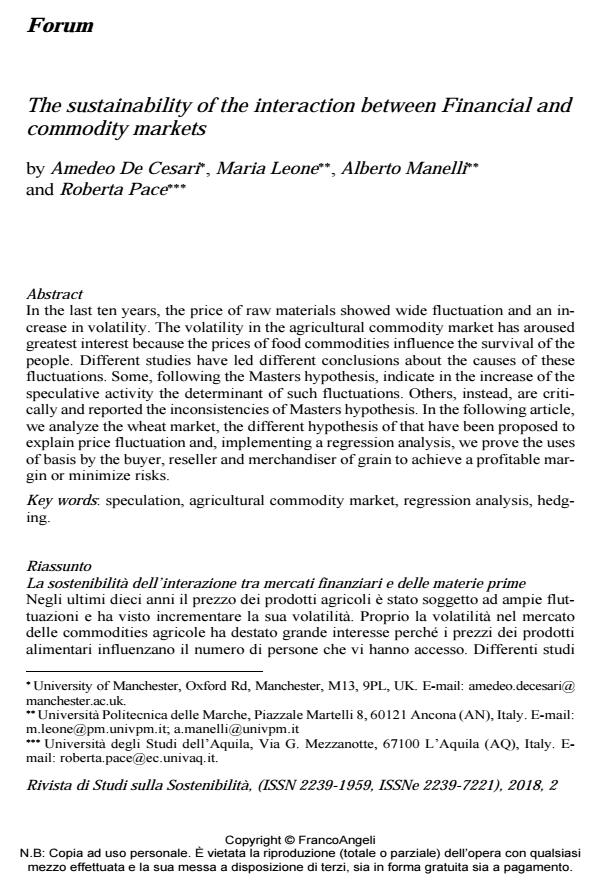The sustainability of the interaction between Financial and commodity markets
Titolo Rivista RIVISTA DI STUDI SULLA SOSTENIBILITA'
Autori/Curatori Amedeo De Cesari, Maria Leone, Alberto Manelli, Roberta Pace
Anno di pubblicazione 2019 Fascicolo 2018/2 Lingua Inglese
Numero pagine 21 P. 133-153 Dimensione file 397 KB
DOI 10.3280/RISS2018-002009
Il DOI è il codice a barre della proprietà intellettuale: per saperne di più
clicca qui
Qui sotto puoi vedere in anteprima la prima pagina di questo articolo.
Se questo articolo ti interessa, lo puoi acquistare (e scaricare in formato pdf) seguendo le facili indicazioni per acquistare il download credit. Acquista Download Credits per scaricare questo Articolo in formato PDF

FrancoAngeli è membro della Publishers International Linking Association, Inc (PILA)associazione indipendente e non profit per facilitare (attraverso i servizi tecnologici implementati da CrossRef.org) l’accesso degli studiosi ai contenuti digitali nelle pubblicazioni professionali e scientifiche
In the last ten years, the price of raw materials showed wide fluctuation and an increase in volatility. The volatility in the agricultural commodity market has aroused greatest interest because the prices of food commodities influence the survival of the people. Different studies have led different conclusions about the causes of these fluctuations. Some, following the Masters hypothesis, indicate in the increase of the speculative activity the determinant of such fluctuations. Others, instead, are critically and reported the inconsistencies of Masters hypothesis. In the following article, we analyze the wheat market, the different hypothesis of that have been proposed to explain price fluctuation and, implementing a regression analysis, we prove the uses of basis by the buyer, reseller and merchandiser of grain to achieve a profitable margin or minimize risks.
Negli ultimi dieci anni il prezzo dei prodotti agricoli è stato soggetto ad ampie flut-tuazioni e ha visto incrementare la sua volatilità. Proprio la volatilità nel mercato delle commodities agricole ha destato grande interesse perché i prezzi dei prodotti alimentari influenzano il numero di persone che vi hanno accesso. Differenti studi circa le cause di queste fluttuazioni hanno raggiunto differenti conclusioni. Alcuni studiosi, seguendo l’ipotesi di Masters, hanno indicato l’incremento dell’attività speculativa come la determinante di tali fluttuazioni. Altri, invece, si sono mostrati critici verso tale ipotesi indicandone i punti deboli. Nell’articolo seguente, si ana-lizza il mercato del grano, le differenti ipotesi che sono state formulate per spiegare le fluttuazioni dei prezzi e, implementando una analisi di regressione, si mostra come gli hedgers utilizzano i mercati a termine e le basi per ottenere margini di profitto e minimizzare i rischi.
Keywords:Speculazione, mercato delle commodities agricole, analisi di regres-sione, hedging.
- Baffes J., Dennis A. (2013). Long-term drivers of food prices, in World Bank Policy Research Working Paper 4982, Washington D.C.
- Bauer P., Minsch R. (2013). Commercio di materie prime agricole: croce o delizia?, Dossierpolitica Economiasuisse, 4.
- Black F. (1976). Valuing corporate securities: some effects of bond indenture provisions, Journal of Finance, 31(2).
- Da silva J.G. (2012). Food Prices Press conference. Rome.
- Davidson J.E.H. (2000). Econometric theory. Oxford: Blackwell.
- Herman M.O., Kelly R., Nash R. (2011). Not a game: speculation vs food security. Oxfam Issue Briefing.
- Hieronymus T.A. (1977). Economics of futures trading.
- Huchet N., Fam P.J. (2016). The role of speculation in international futures markets on commodity prices, Research in International Business and Finance, 37.
- Irwin S.H., Sanders D.R. (2010). The impact of index and swap funds on commodity futures markets: preliminary results, in OECD Food, Agricultures and Fisheries, Working Papers n. 27.
- Irwin S.H., Sanders D.R. (2012). Financialization and structural change in commodity futures markets, Journal of Agricultural and Applied Economics, 43(3).
- Irwin S.H., Sanders D.R., Merrin R.P. (2009). Devil or angel? The role of speculation in the recent commodity price boom and bust, Journal of Agricultural and Applied Economics, 41(2).
- Lagi M., Bertrand K.Z., Bar-Yam Y. (2011). The food crisis and political instability in North Africa and in the Middle East, in SSRN Electronic Journal.
- Lobell D.B., Schlenker W., Costa-Roberts J. (2011). Climate trends and global crop production since 1980, Science, 33(6042).
- Lorton S., White D. (2010). The art of grain merchandising. White Commercial Corporation.
- Masters M.W. (2009). Testimony before the committee on homeland security and government affairs. US Senate
- Masters M.W., White A.K. (2008). The accidental hunt brothers: how institutional investors are driving up food and energy prices. Special Report.
- Pecks A.E. (ed.) (1978). Views from the trade.
- Puma M.J., Bose S., Chon S.J., Cook B. (2015). Assessing the evolving fragility of the global food system, Environmental Research Letters, Vol. 10.
- Robles M., Torero M., Von Braun J. (2009). What speculation matters. IFPRI, Issue Brief 57.
- Stock H.J., Watson M.W., Introduction to econometrics. Pearson.
- US Senate (2009). Excessive Speculation in the wheat market.
- Working H. (1960). Speculation on hedging markets, Food Research Institute Studies, 1(2).
- Zoellick R. (2011). Remarks at the opening press conference World Bank. Washington D.C.
- An insurance company as an element of sustainable development of the state socio-economic system: Ukraine insurance companies case study Zoia Sokolovska, Oksana Klepikova, Tetiana Cherkasova, in RIVISTA DI STUDI SULLA SOSTENIBILITA' 2/2020 pp.53
DOI: 10.3280/RISS2019-002006
Amedeo De Cesari, Maria Leone, Alberto Manelli, Roberta Pace, The sustainability of the interaction between Financial and commodity markets in "RIVISTA DI STUDI SULLA SOSTENIBILITA'" 2/2018, pp 133-153, DOI: 10.3280/RISS2018-002009